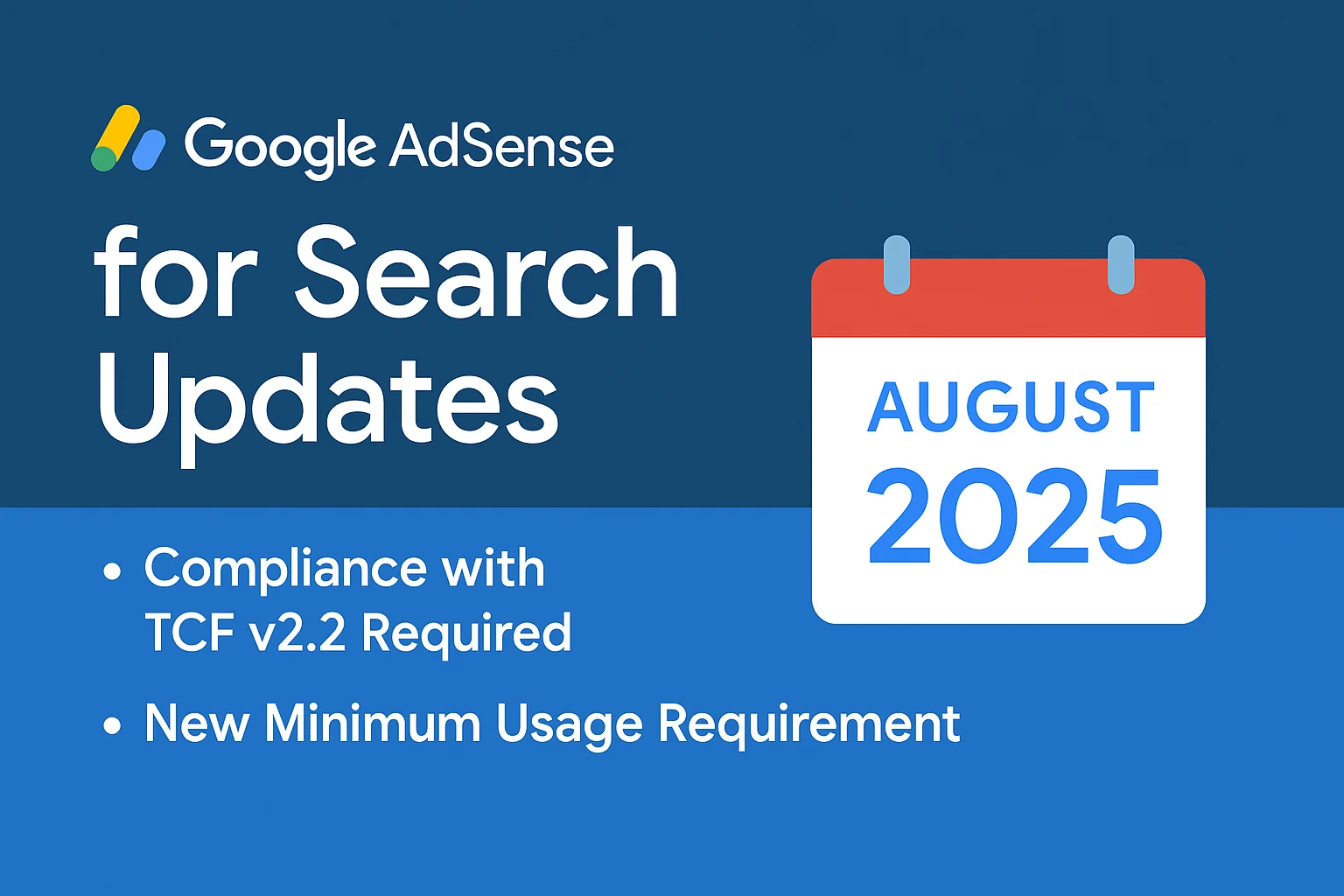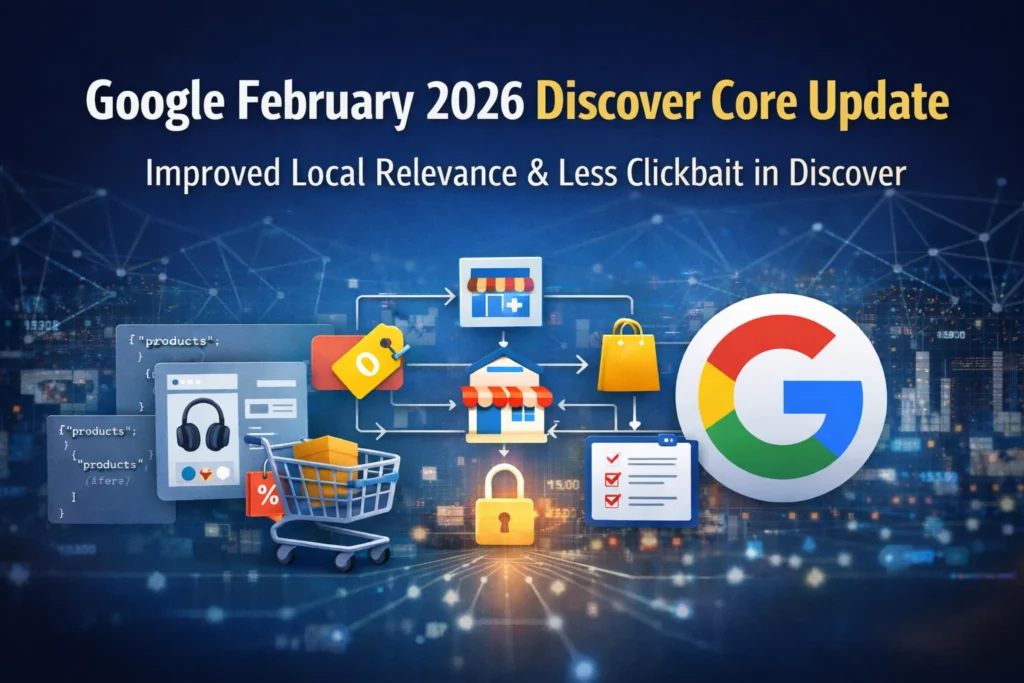Google AdSense for Search (AFS) to Enforce TCF v2.2 Consent Compliance – Here’s What Publishers Must Do

Google has introduced a critical policy update for all publishers using AdSense for Search (AFS), aligning its monetization framework with the IAB’s Transparency and Consent Framework (TCF) v2.2. This change affects any site serving search ads to users in the EEA (European Economic Area) and the UK.
If your website uses AFS and receives even a small percentage of European traffic, this is mandatory — failure to comply will result in search ad serving being limited or disabled.
📌 What Is the New Requirement?
Google’s EU User Consent Policy now mandates that AFS publishers:
“Collect and pass valid user consent using the IAB’s TCF v2.2 signal structure.”
This applies specifically to search-related monetization, bringing it in line with previous consent rules already required for:
- Ad Manager
- AdSense display ads
- AdMob traffic
AFS (AdSense for Search) is the last to receive this enforcement — and Google is rolling it out to all affected accounts soon.
📖 Related: Google’s Organization-Level Policy Updates
👥 Who Is Affected?
You are impacted if:
- You use AdSense for Search on your website
- Your traffic includes users from the EEA or the UK
- You do not already use a TCF v2.2–compliant Consent Management Platform (CMP)
This includes sites using:
- Search boxes powered by AFS
- Search partner integrations
- Custom search implementation with Google monetization
Even if you serve a small volume of EU traffic, this requirement applies universally.
🔐 What Is the IAB’s TCF v2.2?
The Transparency and Consent Framework (TCF) is an industry-standard protocol developed by the Interactive Advertising Bureau (IAB). It allows publishers to:
- Collect and store valid user consent
- Communicate that consent to all ad tech vendors (including Google)
- Comply with GDPR, ePrivacy Directive, and local European laws
The v2.2 version introduces updates that enhance user transparency, limit dark patterns, and require more explicit vendor consent.
⚠️ What Happens If You Don’t Comply?
If you do not pass TCF v2.2 consent signals by the enforcement date:
- AFS monetization in Europe will be restricted
- Ads may not serve to EEA or UK users
- Your account may fall into non-compliance with Google’s EU User Consent Policy
This could lead to:
✅ How to Become Compliant
- Choose a CMP (Consent Management Platform) that is:
- Registered with the IAB
- Supports TCF v2.2
- Can integrate with your AdSense setup
- Integrate the CMP on all pages running AFS code
Make sure consent is collected before any search ad request is triggered. - Verify Consent Signal Transmission
- Use browser tools or CMP dashboards to confirm that:
TCStringis generated- Google is listed as a vendor
- Consent string is passed before search ads fire
- Use browser tools or CMP dashboards to confirm that:
- Monitor Your AdSense Notices
Google will likely issue dashboard notices and send reminder emails — pay close attention in the “Sites” and “Policy Center” tabs.
📖 Related: Google Search Console Crawl Troubleshooting
🧠 Pro Tip: Use a Google Certified CMP
Google provides an official list of certified Consent Management Platforms that support TCF v2.2.
Using a certified CMP ensures:
- Compliance with AdSense’s specific vendor list
- Accurate consent string formatting
- Reduced risk of policy violations
📆 When Is the Deadline?
Google is requiring publishers to adopt this change by July 2024 (as mentioned in the email). The rollout is already in motion, and some publishers have begun receiving warnings or dashboard alerts.
Even if you haven’t received a direct email, you should act now if you use AFS and serve EU/UK users.
📌 Summary of What to Do Now
| Action Required | Status |
|---|---|
| Use a TCF v2.2–compliant CMP | ✅ Required |
| Integrate on all AFS-enabled pages | ✅ Required |
| Pass consent signals to Google | ✅ Required |
| Use only IAB-approved vendors | ✅ Recommended |
| Monitor for policy violations in AdSense | ✅ Strongly Advised |
📖 Related: Structured Data Support for Policy-Linked Pages
Understanding AdSense for Search (AFS) and the New Usage Requirement You Must Meet
Following Google’s recent enforcement of consent signal requirements via TCF v2.2, there’s another important policy update for AdSense for Search (AFS) publishers: a new minimum activity threshold starting in August 2025.
This part of the guide breaks down what AFS is, how it helps publishers, and the specific performance rule that could affect your monetization status.
🔎 What Is AdSense for Search (AFS)?
AdSense for Search (AFS) is a monetization product that allows publishers to:
- Embed a Google-powered search bar on their websites
- Show search ads or shopping ads on results pages
- Earn money whenever a user clicks on an ad displayed alongside those search results
You can use AFS alongside standard AdSense for Content, enabling you to monetize both:
- Your site’s content pages
- Your search results pages
📖 Related: Structured Integration
💡 Key Benefits of AdSense for Search
| Feature | Benefit |
|---|---|
| Highly targeted ads | Matches user’s search intent directly |
| Incremental revenue | Earn more on search pages beyond regular display ads |
| Access to Google Search Network | You can tap into search-based advertiser budgets |
| Shopping Ads | Lets you display shopping product ads directly within search results |
| Related Search Terms | Helps drive traffic to search pages using internal content suggestions |
This dual monetization strategy is especially powerful for:
- Large content publishers
- Blog networks
- Affiliate product comparison sites
- News platforms with internal search
⚠️ New Minimum Usage Requirement: Effective August 2025
Google AdSense will implement a new activity-based policy for AFS:
Starting August 20, 2025, publishers must serve at least 20 search ad impressions in 2 out of the previous 6 months to maintain access to AdSense for Search.
If you fail to meet this threshold:
- Your AFS access will be revoked
- You’ll have to reapply manually to restore monetization
- You risk losing passive search-related revenue
📖 Read: Latest Google Algorithm Updates History
🧠 Why Is Google Doing This?
This update is meant to:
- Ensure active use of AFS (not just inactive embeds)
- Help focus Google’s ad inventory on engaged, search-driven experiences
- Discourage low-volume, low-quality integrations
It’s part of a broader trend where Google tightens access to monetization features for inactive or underutilized placements.
✅ What Publishers Should Do Now
To remain eligible for AFS:
- Check your search ad impressions inside AdSense reports
- Add search functionality in more prominent site areas
- Promote search usage with widgets or CTA-driven navigation
- Add internal “related search” links on high-traffic content pages
📖 Read: Power of Technical SEO to Enhance Internal Search
📋 AFS Minimum Activity Summary
| Requirement | Detail |
|---|---|
| Effective Date | August 20, 2025 |
| Minimum Search Ad Impressions | 20+ in at least 2 of the past 6 months |
| Applies To | All publishers using AdSense for Search |
| Consequence of Non-Compliance | AFS access suspended; must reapply for reinstatement |
🚀 Final Tips to Boost AFS Activity
- Optimize internal search UX
- Use schema to expose search boxes in rich results
- Track impressions via AdSense’s “Search performance” report
- Promote relevant search terms within blog content
📖 Related: How I Fixed Crawled But Not Indexed Errors


Leave a Reply